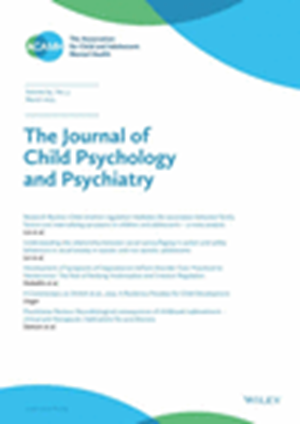同时发生ADHD对自闭症儿童焦虑的认知行为治疗的意义
IF 7
1区 医学
Q1 PSYCHIATRY
引用次数: 0
摘要
儿童心理健康状况经常发生,具有潜在的治疗意义。自闭症儿童经常经历焦虑和注意力缺陷/多动障碍(ADHD)。我们调查了认知行为疗法(CBT)中这种共存的含义,CBT是一种治疗自闭症儿童焦虑的一线疗法。我们测试了(1)ADHD是否预测焦虑治疗的反应,(2)ADHD对焦虑治疗的反应有所改善,(3)ADHD的改善与焦虑的减少有关。方法167名焦虑升高的自闭症儿童参加了一项多地点随机对照试验,比较标准CBT、自闭症适应CBT和常规治疗。ADHD症状和严重程度分别通过家长报告问卷和临床访谈进行评估。进行了线性回归(问题1和2)和线性混合模型(问题3),并对多重比较进行了调整。结果符合ADHD诊断标准的参与者(62%)有更大的预处理焦虑严重程度和焦虑相关的功能障碍,特别是在学校。ADHD对CBT后的焦虑反应没有调节作用。接受CBT(标准或改编)可预测评估者评定的ADHD严重程度的降低,但不能预测家长报告的症状。焦虑严重程度的降低预示着ADHD症状和严重程度的降低。结论现有的CBT方案适合于治疗自闭症患儿伴ADHD的焦虑。未来的研究应该确定CBT治疗焦虑的机制,以提高治疗的准确性和有效性。本文章由计算机程序翻译,如有差异,请以英文原文为准。
Implications of cooccurring ADHD for the cognitive behavioural treatment of anxiety in autistic children
BackgroundChildhood mental health conditions commonly cooccur, with potential treatment implications. Autistic children frequently experience anxiety and attention deficit/hyperactivity disorder (ADHD). We investigated the implications of this cooccurrence for Cognitive Behavioural Therapy (CBT), a front‐line treatment for anxiety in autistic children. We tested whether (1) ADHD predicts anxiety treatment response, (2) ADHD improves in response to anxiety treatment and (3) ADHD improvement is related to reductions in anxiety.MethodAutistic children with elevated anxiety (N = 167) enrolled in a multisite, randomised controlled trial comparing standard CBT, autism‐adapted CBT and treatment as usual. ADHD symptoms and severity were assessed via a parent‐report questionnaire and clinical interview, respectively. Linear regressions (questions 1 and 2) and linear mixed models (question 3) were conducted with adjustments for multiple comparisons.ResultsParticipants meeting diagnostic criteria for ADHD (62%) had greater pretreatment anxiety severity and anxiety‐related functional impairment, particularly at school. ADHD did not moderate anxiety response following CBT. Receiving CBT (standard or adapted) predicted reduction in evaluator‐rated ADHD severity, but not parent‐reported symptoms. Reduction in anxiety severity predicted reduction in ADHD symptoms and severity.ConclusionsExisting CBT programmes are suitable for treating anxiety in autistic children with cooccurring ADHD. Future research should identify mechanisms through which CBT for anxiety also mitigates ADHD, with the aim of improving treatment precision and effectiveness.
求助全文
通过发布文献求助,成功后即可免费获取论文全文。
去求助
来源期刊
CiteScore
13.80
自引率
5.30%
发文量
169
审稿时长
1 months
期刊介绍:
The Journal of Child Psychology and Psychiatry (JCPP) is a highly regarded international publication that focuses on the fields of child and adolescent psychology and psychiatry. It is recognized for publishing top-tier, clinically relevant research across various disciplines related to these areas. JCPP has a broad global readership and covers a diverse range of topics, including:
Epidemiology: Studies on the prevalence and distribution of mental health issues in children and adolescents.
Diagnosis: Research on the identification and classification of childhood disorders.
Treatments: Psychotherapeutic and psychopharmacological interventions for child and adolescent mental health.
Behavior and Cognition: Studies on the behavioral and cognitive aspects of childhood disorders.
Neuroscience and Neurobiology: Research on the neural and biological underpinnings of child mental health.
Genetics: Genetic factors contributing to the development of childhood disorders.
JCPP serves as a platform for integrating empirical research, clinical studies, and high-quality reviews from diverse perspectives, theoretical viewpoints, and disciplines. This interdisciplinary approach is a key feature of the journal, as it fosters a comprehensive understanding of child and adolescent mental health.
The Journal of Child Psychology and Psychiatry is published 12 times a year and is affiliated with the Association for Child and Adolescent Mental Health (ACAMH), which supports the journal's mission to advance knowledge and practice in the field of child and adolescent mental health.

 求助内容:
求助内容: 应助结果提醒方式:
应助结果提醒方式:


